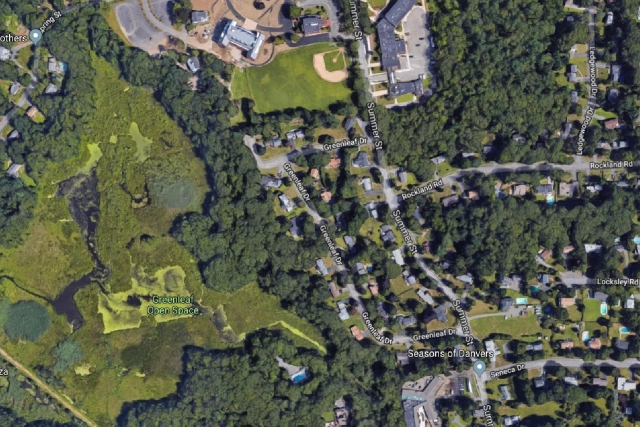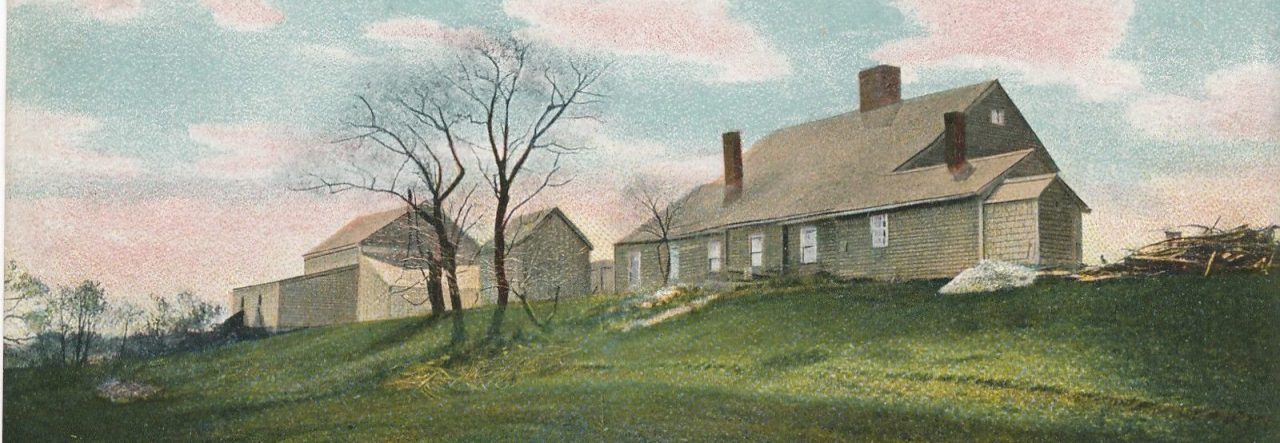(In the Danvers Herald July 5, 2019)

(Oak Knoll. Courtesy of the Danvers Archival Center)
In April 1876, world-renowned poet John Greenleaf Whittier moved to a mansion house on Summer St. in Danvers. Born in Haverhill in 1807, Whittier was one of the “fireside poets,” the first group of American poets that were famous at home and around the world. The group included Whittier, Henry Wadsworth Longfellow, Oliver Wendell Holmes Sr., and James Russell Lowell. In general these writers explored traditional New England countryside themes, and through their writing sought to bring about social change against injustices of their time, and in particular supported the abolition of slavery.

(The “Fireside Poets.” Source: https://archive.org/stream/historyprogresso09sand/historyprogresso09sand#page/n489/mode/1up)
Whittier attended the 1833 convention that founded the American Anti-Slavery Society, of whose importance he later wrote: “I set a higher value on my name as appended to the Anti-Slavery Declaration of 1833 than on the title-page of any book.” Prominent in abolitionist and literary circles, he first had his poems published in a Newburyport newspaper whose editor was William Lloyd Garrison. In later years, Garrison went on to become one of the best-known abolitionists as founder of the American Anti-Slavery Society and editor of The Liberator, a leading anti-slavery newspaper that also advocated for women’s rights. The two became life-long friends, though they had disagreements about the best tactics for the abolitionist movement.
(The first page of a letter Whittier wrote while at Oak Knoll to William Lloyd Garrison. Digital Commonwealth: https://www.digitalcommonwealth.org/search/commonwealth:dv142x13s)
Built in 1842, the house in Danvers to which Whittier moved in 1876 was a stunning Greek Revival-style country mansion. Whittier named it “Oak Knoll” because in front of the house there was a small rise with a grand oak tree upon it. The estate had manicured hedges, rolling lawns, rose gardens, and wild countryside surrounding it. The poet so loved the beautiful nature around his residence that when invited to go on carriage rides to other estates he was known to reply, “We will see nothing more beautiful than what we have at home.” After moving to Danvers, Whittier was offered as a gift the lavish Kernwood estate (now the country club) along the Danvers River in Salem. He refused, preferring the beautiful natural surroundings of Oak Knoll.

(Map of Oak Knoll. Historic American Building Survey, 1936, Library of Congress. Note Summer Street along the bottom edge.)
Whittier wrote more than 100 poems while living in Danvers, including the collections The Vision of Echard, and Other Poems (1878) and his last book of poems, At Sundown (1890). There are many of Whittier’s manuscripts and early-edition published works in the Danvers Archival Center. In his study, Whittier wrote at a desk from the Haverhill schoolhouse that he attended as a child, which was later donated to the Danvers Historical Society.
One of the best-known poems Whittier wrote at Oak Knoll was “The Witch of Wenham.” The poem’s theme is the witch-hunt of 1692, which began in what is now Danvers and spread throughout the surrounding towns. The poem reveals Whittier’s historical knowledge, and ends with a description of the area near Oak Knoll,
And when once more by Beaver Dam
The meadow-lark outsang,
And once again on all the hills
The early violets sprang,
And all the windy pasture slopes
Lay green within the arms
Of creeks that bore the salted sea
To pleasant inland farms,
The smith filed off the chains he forged,
The jail-bolts backward fell;
And youth and hoary age came forth
Like souls escaped from hell.
While living in Danvers, a steady parade of famous figures came to visit the elder poet and one historian describes these visitors “as pilgrims to a shrine.” The Emperor of Brazil Dom Pedro II visited Whittier at Oak Knoll. The Emperor was a man of letters who sponsored education in recently-independent Brazil, and worked to abolish slavery in that land. Another visitor was Dorothea Dix, an activist working for prison reform, and especially to end the practice of incarcerating mentally insane individuals in prisons because there were no other facilities for them. Her work led to the establishment of special hospitals across the country to treat those with mental illness. At her death, Dix was buried with a copy of Whittier’s poem “At Last” in her hands.

(His Imperial Majesty The Emperor Dom Pedro II of Brazil. Shown here in 1872. https://commons.wikimedia.org/wiki/File:Pedro_Am%C3%A9rico_-_D._Pedro_II_na_abertura_da_Assembl%C3%A9ia_Geral.jpg)
One of Whittier’s visitors who played an unusual role in American history was Samuel J. Tilden, a long-time friend and abolitionist. Whittier was at Oak Knoll in 1876 when newspapers announced that Tilden may or may not have been elected President of the United States. Tilden received the most votes, but due to disputed recounts it was not clear whether he or Rutherford B. Hayes won the required electoral votes. A constitutional crisis ensued, President Grant sent federal troops to secure Washington, DC in case of civil unrest, and in the end a special commission declared Hayes the winner. When Tilden died in 1886, Whittier wrote a poem of remembrance published in a Boston newspaper.
Whittier was particularly respected in his later years as the last of the greatest generation of American poets. On Whittier’s 80th birthday Massachusetts Governor Oliver Ames attended a large party with 600 invited guests to honor the luminary. A few years before, in 1885, Whittier was asked to write the inscription on the memorial to Rebecca Nurse, hanged for witchcraft in 1692. He was described at the memorial’s dedication as “one of the most eminent and beloved poets of the present age.” Whittier died in 1892 while visiting a friend in New Hampshire.


(Whittier’s grave, Union Cemetery, Amesbury, Mass.)
When a biographer asked Whittier later in his life whether he considered Oak Knoll or a house he owned in Amesbury as his true home, the poet said of Oak Knoll, “Say, it is my home. I retain my legal residence in Amesbury, and I go there to vote, but my home is at ‘Oak Knoll.’”
Oak Knoll was torn down by a developer in 1958. The area of the former estate is now split between the Greenleaf Drive neighborhood and the beautiful marshland of the Greenleaf Open Space Area, preserved as natural land, much the same as it was in Whittier’s day.

(The area of the former Oak Knoll today. Google Maps)
—————————————————————————————————————————————–Sources:
Academy of American Poets. “A Brief Guide to the Fireside Poets | Academy of American Poets.” Text. Accessed June 13, 2019. https://poets.org/text/brief-guide-fireside-poets.
———. “Snow-Bound [The Sun That Brief December Day] by John Greenleaf Whittier – Poems Academy of American Poets.” Accessed June 13, 2019. https://poets.org/poem/snow-bound-sun-brief-december-day.
Danvers Archival Center. “Fiscal Year 2014 Annual Report,” August 9, 2014. https://www.danverslibrary.org/archive/2014-annual-report/.
Poetry Foundation. “John Greenleaf Whittier.” Poetry Foundation, June 13, 2019. https://www.poetryfoundation.org/poets/john-greenleaf-whittier.
Sanderson, Edgar, John Porter Lamberton, and Charles Morris. The History and Progress of the World. Philadelphia, T. Nolan, 1913. http://archive.org/details/historyprogresso09sand.
Tapley, Charles S. Country Estates of Old Danvers. Danvers, Mass., n.d.
Tapley, Harriet S. Chronicles of Danvers (Old Salem Village), Massachusetts, 1632-1923. Danvers, Mass.: The Danvers Historical Society, 1923.
Upham, William P. “Account of the Rebecca Nurse Monument.” In Essex Institute Historical Collections, 23:151–60, 201–28. Salem, Mass.: The Essex Institute, 1886.
Woodman, Abby J. Reminiscences of John Greenleaf Whittier’s Life at Oak Knoll, Danvers, Mass. Salem, Mass.: The Essex Institute, 1908. https://catalog.hathitrust.org/Record/007677070.
